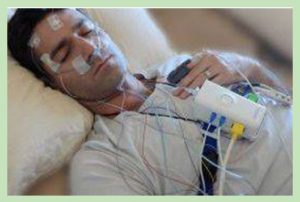What is SLEEP APNEA?
Sleep apnea is a serious sleep disorder . Which occurs when a person’s breathing is interrupted during sleep. People with untreated sleep apnea stop breathing repeatedly during their sleep, and sometimes hundreds of times. Which means the brain — and the rest of the body — may not get enough oxygen. Sleep Apnea can be diagnosed with Sleep Study Test.
There are two types of sleep apnea:
Obstructive sleep apnea (OSA): The more common of the two forms of apnea, it is caused by blockage of the airway, usually when the soft tissue in the back of the throat collapses during sleep.
Central sleep apnea: Unlike OSA, the airway is not blocked, but the brain fails to signal the muscles to breathe, due to instability in the respiratory control center.
In general, most of the patients shows a mixed type of symptoms. Which involves both Obstructive airway and Central nervous system.
Common symptoms of SLEEP APNEA
- Loud snoring. Which is usually more prominent in obstructive sleep apnea
- Episodes of breathing cessation during sleep. As noticed by Bed Partner.
- Abrupt awakenings accompanied by shortness of breath. Which is more likely indicates central sleep apnea.
- Awakening with a dry mouth or sore throat.
- Morning headache.
- Difficulty staying asleep (insomnia)
- Excessive daytime sleepiness (hypersomnia)
- Attention problems
- Irritability
Should I consult a doctor?
One should consult with doctor if experiences,
- Snoring , that loud enough to disturb the sleep of others or yourself
- Shortness of breath, and gasping for air or choking that awakens you from sleep
- Intermittent pauses in your breathing during sleep
- Excessive daytime drowsiness, which may cause you to fall asleep while you’re working, watching television or even driving
Risk factors for Sleep Apnea:
A common misconception is that sleep apnea only affects older, overweight men. Which is a widely-held assumption. As, anyone can have sleep apnea, regardless of gender, age or body type. If you have any of the following traits you may be at increase risk:
Excess weight – An adult with a BMI of 25 or higher is overweight. Your risk of sleep apnea increases with the amount of excess body weight.
Large neck size (>17 inches for men, > 16 inches for women) – A large neck will have more fatty tissue that can block your airway.
Older age (40+ for men, 50+ for women) – Sleep apnea occurs more often in older adults, especially people older than 60.
Being male: Men have twice the risk having sleep apnea over women
Smoker: Smokers have a higher risk of sleep apnea
Hypertensive: High blood pressure is very common in people with sleep apnea
Family history: Sleep apnea can appear more often among family members. Which may be a result of either inherited traits or common lifestyles.
Diagnosis of SLEEP APNEA
In-lab overnight sleep study test :
This type of sleep study requires you to stay overnight at a sleep center, in a bed that may resemble a hotel room. You will sleep with sensors in various parts of your body. And these sensors record your brain waves, heartbeat, breathing and movement. Doctors usually recommend a sleep study for more complex cases. An in-lab sleep study is the more expensive option.
Home sleep study test :
Practically, for most of the people, its quite tough & challenging to sleep in an unknown environment being connected with many sensors & gadgets. Hence, most of the doctors these days recommend for home screening of sleep apnea. Moreover, all important and relevant parameters can be assessed very effectively with modern test device. A system generated report will tell about patient’s snoring profile, Oxygen saturation during sleep, any obstruction and associated cecasion of breath. Moreover, an evaluation can also be done on Chest movement, leg movement, sleeping position etc during the study.

Like to have more information on
Sleep Apnea & Management
Reach us any time at:
+91 98361 07455, +91 83348 40005, +91 94331 19656

